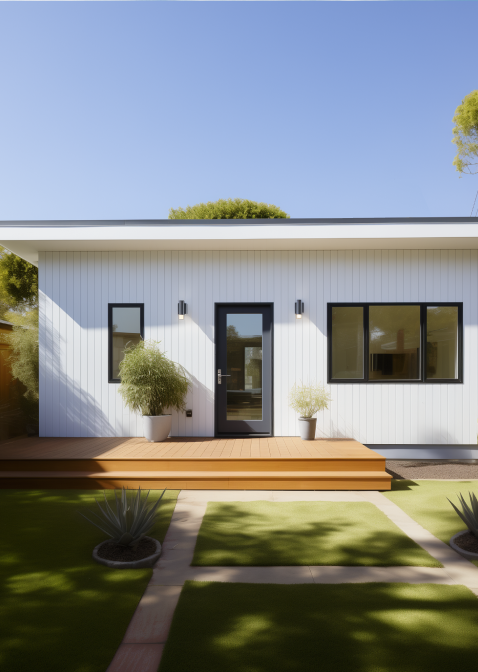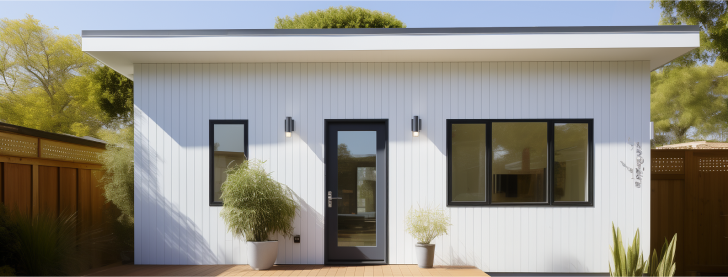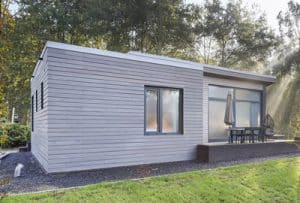 As our world continues to evolve, a novel trend is steadily gaining traction in the realm of residential living: the small house movement. Rejecting the conventional notion that bigger is always better, proponents of compact living are discovering the manifold advantages that come with residing in smaller spaces.
As our world continues to evolve, a novel trend is steadily gaining traction in the realm of residential living: the small house movement. Rejecting the conventional notion that bigger is always better, proponents of compact living are discovering the manifold advantages that come with residing in smaller spaces.
In this article, we will journey through the financial, political, social, and other facets of small house living, unveiling the myriad of untold benefits that await those who embrace this innovative lifestyle.
Financial Boons of Small House Living
Dwelling in a smaller abode offers an array of financial perks that contribute to a more sustainable and stress-free existence.
As residents of small houses, individuals can revel in the following monetary advantages:
- Diminished acquisition costs: The reduced square footage of small houses translates to lower purchase prices, enabling homeowners to secure their dream abodes without breaking the bank.
- Slashed upkeep expenses: Smaller spaces necessitate fewer resources for maintenance and repairs, granting homeowners more financial leeway to allocate funds to other aspects of their lives.
- Energy thriftiness: Compact living quarters require less energy for heating, cooling, and illumination, resulting in lower utility bills and a more eco-friendly lifestyle.
Inventive Utilization of Limited Space
One of the most remarkable aspects of small house living is the ingenious use of limited space.
Through clever design and innovative solutions, small house dwellers can experience:
- Multipurpose magic: Small house designs often incorporate multifunctional features, such as fold-out furniture and convertible spaces, allowing residents to adapt their living quarters to suit their ever-changing needs.
- Vertical ingenuity: By maximizing vertical space, small houses can accommodate ample storage and unique architectural features, creating a sense of spaciousness despite their compact size.
- Customized creativity: The limited square footage of small houses encourages residents to personalize their living spaces, resulting in distinctive, individualized sanctuaries that reflect their unique tastes and preferences.
Legislative Implications of Small House Living
As the popularity of small houses continues to soar, political landscapes are adapting to accommodate this novel form of habitation.
This transformative shift is evident in:
- Zoning adaptations: Lawmakers are revisiting outdated zoning regulations, promoting small house-friendly policies that encourage the proliferation of compact living communities.
- Financial incentives: Governments are offering tax breaks, grants, and other monetary rewards to encourage the construction and purchase of small houses, recognizing their potential to address affordable housing crises.
- Sustainable urban planning: The small house movement is inspiring policy changes that prioritize sustainable development, including green building initiatives, eco-friendly infrastructure, and resource-efficient public spaces.
Social Benefits of Small House Living: a Link to Finance
Small houses foster the development of tight-knit communities where social bonds flourish. By choosing to live in compact quarters, individuals can experience a plethora of social boons.
To illustrate, let us speculate on the following instances:
- Intensified interpersonal connections: The close proximity of small house dwellers encourages frequent interaction, leading to stronger friendships and a supportive network of neighbors.
- Collaborative living: Small house communities often share resources and amenities, promoting a culture of cooperation and interdependence that nurtures social cohesion.
- Empathy cultivation: The small house lifestyle exposes residents to diverse perspectives and lifestyles, fostering empathy, understanding, and tolerance among community members.
Physical Implications of Small House Living
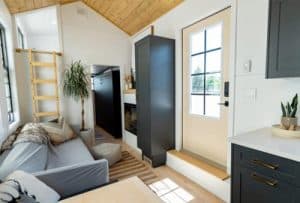
Surprisingly, small house living can also provide numerous physical benefits, contributing to a healthier and more active lifestyle.
These instances are commonly mentioned in relation to the physical benefits of ADUs:
- Encouraging outdoor pursuits: With limited indoor space, small house dwellers are more likely to engage in outdoor activities, boosting their physical fitness and overall well-being.
- Promoting mindful consumption: The restricted storage capacity in small houses encourages residents to make conscious purchasing decisions, often leading to healthier eating habits and reduced materialism.
- Minimizing allergens: Smaller spaces are easier to clean and maintain, reducing the presence of dust, mold, and other allergens that can negatively impact respiratory health.
Psychological Perks of Small House Living
The decision to inhabit a small house can have profound effects on one’s psychological well-being.
Some of the mental benefits associated with compact living include:
- Simplification and clarity: The limited space in small houses encourages residents to declutter and prioritize possessions, leading to a more organized, streamlined existence that alleviates mental strain.
- Amplified satisfaction: The financial and environmental benefits of small house living can foster a sense of pride and contentment, boosting overall happiness and fulfillment.
- Enhanced focus: The reduced distractions and clutter in a small house can create a serene environment conducive to concentration, promoting productivity and creativity.
Environmental Advantages of Small House Living
Small houses are intrinsically eco-friendly, promoting sustainable living practices that minimize the impact on our planet.
Residents of small houses can revel in the knowledge that they are:
- Reducing their carbon footprint: The efficient use of space and resources in small houses translates to lower greenhouse gas emissions, mitigating the detrimental effects of climate change.
- Conserving resources: The construction and maintenance of small houses require fewer raw materials and resources, reducing waste and promoting responsible consumption.
- Encouraging green innovation: The small house movement is driving the development of cutting-edge eco-friendly technologies, such as solar power systems, rainwater collection, and composting toilets, which contribute to a more sustainable future.
ADU’s Benefits for Dwellers: What is Clear
The benefits of small house living extend far beyond mere novelty, encompassing financial, political, social, psychological, environmental, and even physical aspects of life. By embracing the wonders of compact living, individuals can forge a path toward a more sustainable, interconnected, and fulfilling existence.
As the small house movement continues to gain momentum, it challenges conventional wisdom, inspiring a reevaluation of our priorities and an exploration of the untapped potential that lies within the boundaries of less.
Whom Small House Living May Prove Incompatible
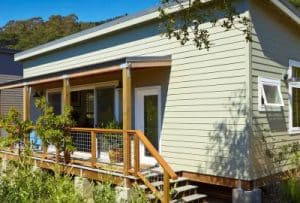
While the small house movement has piqued the curiosity of many, it is essential to acknowledge that this lifestyle may not be well-suited for everyone. In fact, for certain groups of individuals, exploring the small house market could lead to dissatisfaction or even harm. By pinpointing these categories of dwellers, we can help ensure that housing choices align with personal needs and overall well-being.
Certain experts claim that if one belongs to one of these categories, he should carefully approach the ADU realm:
- Space aficionados: Those who derive pleasure from vast, open living spaces may find the confines of a small house stifling, leading to feelings of claustrophobia and distress.
- Ardent collectors: For passionate collectors with extensive possessions, attempting to downsize to a small house may cause emotional turmoil as they grapple with parting from cherished items.
- Expanding families: Individuals with growing families or plans for future expansion may find the limited space of small houses inadequate for accommodating their evolving needs, resulting in discomfort and discord.
- Entertaining enthusiasts: People who relish hosting grand soirees and elaborate gatherings may struggle to adapt to the spatial constraints of a small house, ultimately leading to a sense of unfulfillment and dissatisfaction.
- Home-based entrepreneurs: Professionals who operate sizable businesses from their homes may find the restricted square footage of small houses insufficient for their operations, hampering productivity and impeding success.
By recognizing the individuals for whom small house living may prove incompatible, we can foster informed decision-making and encourage housing choices that align with personal preferences and lifestyle needs.
 As our world continues to evolve, a novel trend is steadily gaining traction in the realm of residential living: the small house movement. Rejecting the conventional notion that bigger is always better, proponents of compact living are discovering the manifold advantages that come with residing in smaller spaces.
As our world continues to evolve, a novel trend is steadily gaining traction in the realm of residential living: the small house movement. Rejecting the conventional notion that bigger is always better, proponents of compact living are discovering the manifold advantages that come with residing in smaller spaces.

